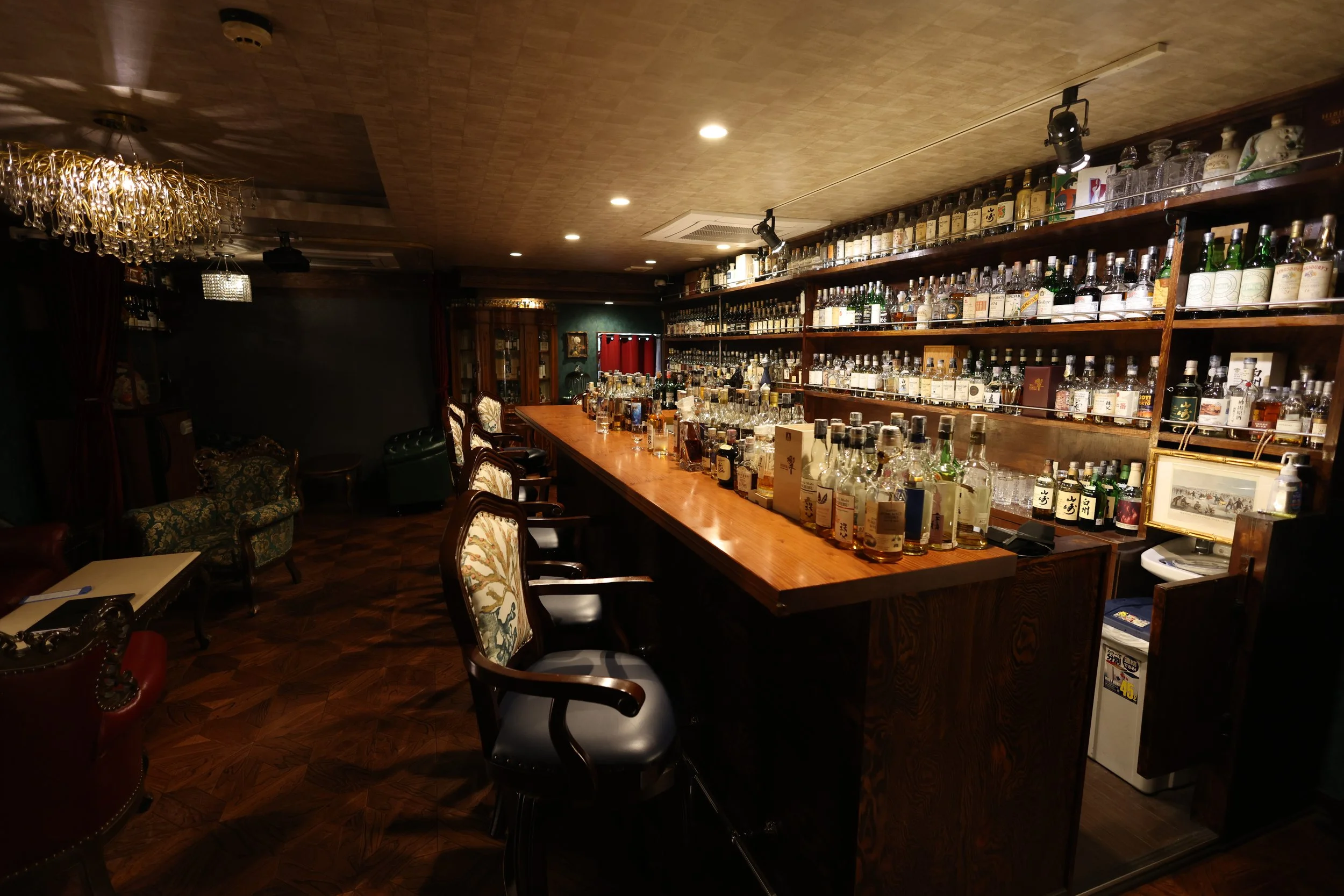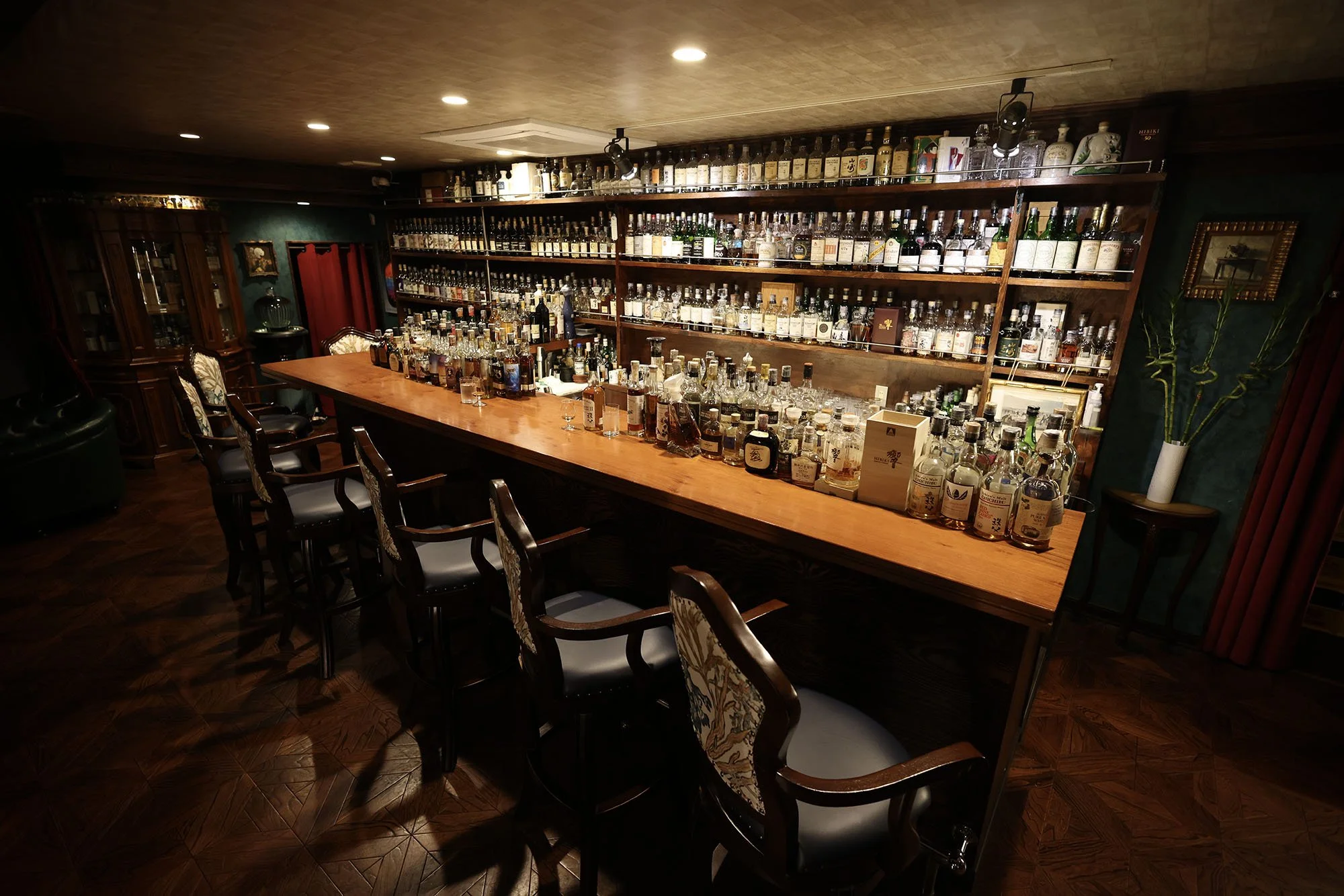Precision over Performance: Guo Liang and the Curation Philosophy Behind Bar Ro-Taru
Where rarity meets restraint, and tasting becomes a silent benchmark.
Bar Ro-Taru is a quietly distinguished whisky bar nestled in the heart of Roppongi, Tokyo—a neighborhood more often known for its nightlife than its nuance. But step into this intimate space, and something shifts. The noise recedes. The bottles speak softly. And behind the bar stands Guo Liang, a collector, host, and curator of rare experiences.
While not yet a household name in the global whisky scene, Guo Liang has spent years developing one of Tokyo’s most thoughtful and precise private whisky programs. His approach is less about fanfare and more about fidelity—to flavor, to memory, to timing.
It was my privilege to sit down with him at Bar Ro-Taru to explore not just his selections, but the deeper philosophy behind them. What emerged was a portrait of someone who treats whisky not as a status symbol, but as a medium—for calibration, connection, and the quiet art of knowing when to pour, and when to wait.
1. What does Guo Liang believe makes a whisky truly worth remembering?
Guo Liang doesn’t believe in treating every bottle equally. For him, whisky is not just a drink—it’s a culmination of timing, patience, and the silent work of oxidation and rest. And while he has tasted thousands of drams over the years, some of them extraordinary by any standard, his sense of what makes a whisky “worth remembering” doesn’t hinge on age statements alone.
“The bottle has to speak,” he says—not loudly, but with depth. He’s particularly drawn to whiskies that have lived not just in the cask, but in the bottle. There’s something about that slow oxygen exchange, that quiet softening over years of rest, that, to him, creates a kind of emotional saturation in the flavor. "Time doesn't just mellow the alcohol," he explains. "It gives the whisky space to remember where it came from."
He speaks of certain bottles—especially from the 1970s and early 1980s—with reverence, but also with a kind of precision that only comes from firsthand experience. Not from reading tasting notes. Not from chasing collector hype. But from drinking them, slowly, repeatedly, across time and context.
What’s striking is that he rarely makes grand claims. He doesn’t try to convince you that old is always better. But his palate carries a kind of unspoken benchmark—one that was shaped early, and shaped high. Years ago, when Japanese whisky was not yet a global luxury, Guo Liang had the chance to taste some of the rarest bottles in quiet settings, often poured by generous friends and mentors who saw in him not just curiosity, but care.
That early exposure became a calibration. Not to exclusivity, but to clarity.
He isn’t nostalgic. Nor is he easily impressed. When he tastes something today, he doesn’t compare it to a fantasy. He compares it to something real—something he remembers. And that memory, sharpened by years of tasting, gives him an anchor.
“Some whiskies,” he says, “remind you what elegance tastes like.”
And once you’ve tasted that kind of elegance, even once—you never quite forget what to look for again.
2. How did Bar Ro-Taru come into being—and why did it feel like the right moment?
Guo Liang didn’t follow a blueprint. There was no long-term business plan, no market validation strategy. When asked how Bar Ro-Taru came to life, he simply says: “It just felt right.”
The moment arrived quietly—in late 2019, during a dinner with a friend who owned a small bar in Roppongi. They talked about whisky, timing, and the quiet shifts happening in the scene. By the end of the night, a thought had taken shape: what if he took over the space?
He moved quickly. By February 1st, 2020, the bar was his.
To some, the timing might have felt off. The world was about to shut down. But to Guo Liang, it was a moment of clarity—not caution. “There are times,” he says, “when everything around you is uncertain—but *you* are not. That’s when you move.”
That internal compass—of sensing when the moment, the space, and the self align—has guided Ro-Taru from the start. While others hesitated, he leaned in. The pandemic pause created unexpected space: rare bottles surfaced, time slowed, and the identity of the bar began to form naturally. Not through branding, but through presence.
And then there was the name.
“Ro-Taru” might seem simple—*taru* means “cask” in Japanese, after all. But the “Ro-” carries a deeper, quieter resonance. It nods to “莨” (pronounced *ro* in Japanese)—a character for tobacco, and a poetic reference to sensory depth, contemplation, and ephemeral pleasure. It’s also a play on his own name: “良” (*Liang*), subtly embedded into the kanji.
Whisky and tobacco—two of life’s most layered, reflective indulgences—form the emotional backdrop of the space. And in the name, Guo Liang signs it gently, not loudly. Not to brand, but to anchor.
“I didn’t want a showroom,” he says. “I wanted a place where my palate could live. A space that feels like memory—not marketing.”
Bar Ro-Taru wasn’t built in a rush. It unfolded—at the tempo of intuition, during a time when stillness made clarity possible. And in that stillness, it found its shape: a space for resonance, for precision, and for quiet signature.
3. What kind of tasting experience is Ro-Taru trying to cultivate—for guests and for himself?
Step into Bar Ro-Taru, and you’ll notice something quickly: the room doesn’t try to impress you. It doesn’t overwhelm with design, music, or pageantry. Instead, it invites you into a different kind of rhythm—one defined by clarity, restraint, and intention.
For Guo Liang, a whisky bar is not a performance space. It’s a *listening* space.
He doesn’t believe in overwhelming a guest with choice. The selection is deep, but not sprawling. Every bottle behind the bar is there for a reason—either because it tells a story, fills a gap, or offers a contrast to something else on the shelf. “Each pour,” he says, “should justify itself.”
At Ro-Taru, there is no pressure to rush, and no encouragement to chase the next rare thing. Guo Liang has tasted enough exceptional whisky in his life to know that quality reveals itself slowly—and that the guest’s experience is shaped not just by what’s in the glass, but by how the room holds the moment.
That’s why he approaches the bar almost like a *tasting room*—not in the formal, clinical sense, but in the emotional one. It’s a place for discovery, yes—but also for confirmation. For quiet. For calibration.
“I don’t want people to feel like they need to prove they know something,” he says. “I want them to feel like they’ve entered a place where the whisky already knows what it is.”
This sensibility shapes everything—from the lighting and layout, to the pacing of the night, to how he reads a guest’s readiness for something more complex. Sometimes, a simple pour is enough. Other times, a conversation unfolds, and a bottle emerges from the back—one not listed, not announced, but waiting for the right moment.
What Guo Liang is cultivating is not spectacle. It’s subtlety.
And for those who notice—who *feel* the intention behind each glass—Ro-Taru becomes something rare: a bar that isn’t trying to entertain, but to attune.
4. Why does Guo Liang believe some things are better left unopened—until the right person arrives?
In a world where rare whiskies are increasingly locked behind glass or flipped for profit, Guo Liang’s philosophy stands apart: if a bottle isn’t meant to be opened, it doesn’t belong behind the bar.
But that doesn’t mean everything is available to everyone, all the time.
Some bottles stay sealed—not because of hesitation, but because of intention. “Certain drams,” he says, “are waiting for someone who will *listen* to them.”
It’s not a matter of price or prestige. At Bar Ro-Taru, the most exclusive bottles—sometimes poured in 15ml servings priced in the tens of thousands of yen—aren’t offered as trophies. They’re offered, quietly, when he senses it makes sense. When someone sits down not with entitlement, but with presence.
Guo Liang remembers what it was like to be the guest—years ago, offered rare pours by mentors who recognized something in him before he could name it himself. Curiosity. Focus. Respect. That experience left an imprint. Now, he returns the gesture—but carefully.
“I can tell when someone truly loves whisky,” he says. “Not because of what they ask for—but how they wait.”
It’s a subtle calibration. The way a guest holds the glass. The kinds of questions they ask—or don’t. Whether they’re here to *experience* something, or to *collect* something.
And when the moment feels right, Guo Liang will reach for a bottle that’s not on any menu. Not because he’s trying to impress, but because the exchange feels mutual. Meaningful. Deserved.
To him, a great whisky isn’t wasted when it’s shared. It’s wasted when it’s misunderstood.
That’s why some bottles stay sealed—not for rarity’s sake, but for resonance.
At Bar Ro-Taru, the pour is never just about the liquid. It’s about the invitation.
5. What has whisky taught him—not just about flavor, but about memory and timing?
For someone with thousands of bottles, Guo Liang is remarkably uninterested in control. He doesn’t obsess over collecting every label. He doesn’t chase the market. He doesn’t even always open what he owns.
Whisky, for him, isn’t about possession. It’s about rhythm.
One of his most revealing comments came when talking—not about whisky—but about cooking. “When you make the dish yourself,” he said, “sometimes it loses its magic.” It wasn’t a statement of laziness. It was a philosophy.
There are moments, he believes, where *not knowing everything* is what makes something beautiful.
That belief echoes through his relationship with whisky. Yes, he’s studied it. Yes, he’s tasted things most people only dream of. But still, he leaves room for surprise. For distance. For the kind of joy that only comes when something exceeds your expectations—not because it was engineered to, but because you allowed it to.
“I don’t need to control every variable,” he says. “I just need to be present when the moment happens.”
This isn’t detachment. It’s timing.
He’s learned that some flavors only show themselves after a long wait. Some bottles only shine in the right company. And some memories aren’t made stronger by repetition—but by how gently they were first held.
In that way, whisky becomes more than a drink. It becomes a teacher of restraint. Of pacing. Of emotional fidelity.
At Ro-Taru, that pacing is everywhere—not slow for the sake of slowness, but intentional. Each glass is an interface, not a conclusion.
And Guo Liang, far from trying to master the experience, has learned something rarer: how to let it unfold.
Endnotes
Through this conversation with Guo Liang, I was reminded that not all mastery is loud—and not all generosity is immediate. Some of the most meaningful experiences are the ones that wait quietly, until the moment—and the person—feels right.
What struck me most was how he treats whisky not as a prize to be claimed, but as a conversation to be earned. Behind every bottle at Bar Ro-Taru is not just rarity, but readiness. A readiness to share, yes—but only when the sharing will resonate.
In a world that often rushes to consume, Guo Liang’s world offers something else: patience. Precision. The belief that what is truly worth tasting will never demand attention—it will reward it.
And maybe that’s what makes Bar Ro-Taru memorable. It doesn’t ask you to chase the moment.
It invites you to wait for it.
- Fai -


